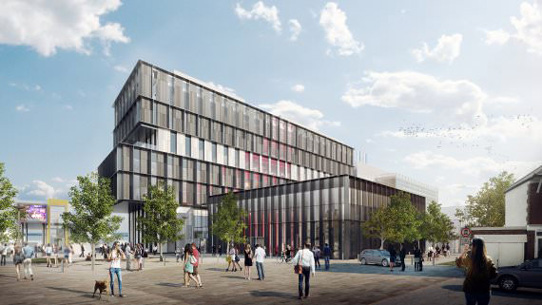- News
14 November 2016
Cardiff University's £300m Innovation Campus approved by city planners
Cardiff City Council planners have approved the latest phase of Cardiff University's £300m Innovation Campus, which will host a range of facilities geared to innovation, including the Institute for Compound Semiconductors (a UK-based translational research centre in compound semiconductors) and the Cardiff Catalysis Institute (featuring a catalysis facility to support Cardiff's research in chemical sciences).
Two new buildings (each covering 12,000m2) will bring researchers, businesses, public sector backers and students together to forge processes that aim to create technological innovations, spin-out companies, partnerships and new products and services.

The fully funded £135m project on the city's brownfield Maindy Park is the third phase in Cardiff's mission to embed innovation in university life. The campus vision, outlined two years ago by Vice-Chancellor professor Colin Riordan, establishes centres of excellence that aim to push benefits back into the economy to create a self-sustaining cycle for growth. "Cutting-edge research, technology transfer, business development and student enterprise will put ideas to work," says Riordan. "We are hiring internationally renowned academics who can build world-class teams of post-doctoral researchers. We are equipping students with the skills they'll need to set up future ventures. And we're continuing to attract major UK and international funding across private and public sectors," he adds.
Lettable office and lab space will be available to ventures - from small start-ups through to major corporates - who want to work directly with one of the UK's leading research universities. Also, a bridge will link to the Cardiff Business School.
Architects Hawkins\Brown and HOK worked on the project alongside site masterplanners BDP and town planning consultancy DPP.
"We've worked closely with the university to develop new models for space use and the integration of industrial partners and collaborators in an HE [high education] context," says Hawkins/Brown partner Oliver Milton. This has resulted in a clear design with interactive working spaces organized around a central 'oculus' that connects the six storeys. Shared facilities include a Ted-ex auditorium and fabrication lab to trial new manufacturing technologies."
"We look forward to creating cutting-edge facilities that will reinforce the university's international reputation as a leading catalysis research centre and build on its strengths in the development of semiconductor devices and materials," says Adrian Gainer, regional leader for HOK's Science + Technology group. "Both the Institute for Compound Semiconductors and the Cardiff Catalysis Institute have been designed to enable multidisciplinary research to flourish," he adds.
"The campus fulfils a number of aspirations for Cardiff University and aims to facilitate world-leading scientific research, inter-disciplinary mixing and increase student opportunities in an environment that's better for business," comments BDP's Martin Jones.
"We worked very closely with the university and Cardiff Council to ensure that this exciting scheme could be delivered within an outline planning consent dating back to 2010," says DPP's Gareth Hooper. "The result is the continuation of an exciting regeneration project, delivering physical change to the city through world-leading science."
Cardiff University hopes to start work on site early in 2017.
Professor Colin Whitehouse appointed chair of Compound Semiconductor Centre
IQE and Cardiff University to help spearhead £50m UK Compound Semiconductor Applications Catapult
CSC formally launched as first compound semiconductor cluster
www.cardiff.ac.uk/innovation/campus-investment/translational-research-facility/


